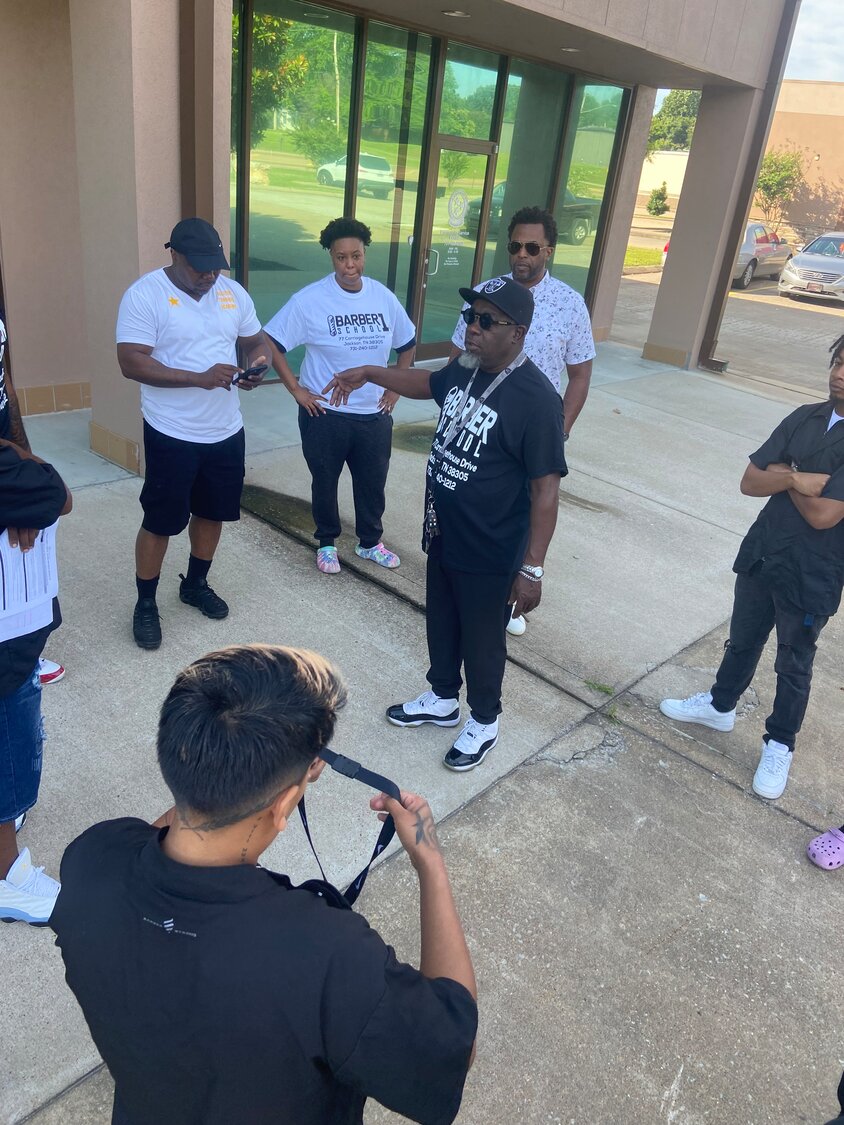Business owners protest alleged discrimination
Editor's note: This story has been edited since publication.
A single mother of three working multiple jobs may not be fully aware of the options she has to put herself in a better financial position to take care of her family.
The same for a man who’s been convicted of a crime and served a few years in prison and is free after paying his debt to society.
They may not have training to ply a trade, but then they find out about training for different trades. Two that are available in Jackson are All-Star Training Academy that trains people and helps them get certified to drive forklifts in warehouses and Barber School-1, which teaches people and gets them certified in haircare.
Both of those places charge tuition for the training, but neither the single mother nor the released prisoner in many cases have enough money to pay the tuition.
There are federal and state programs that award grants to people who seek training for different jobs, but the students have to apply for and awarded those grants and scholarships.
But the owners of both All-Star and Barber School-1 say there’s a problem.
“Our potential students aren’t getting approved for the funding,” said Reggie Carrick, the owner and operator of All-Star Training Academy. “I’ve been doing this for 10 years in Memphis, and I opened my second location in Jackson two-and-a-half years ago, and for whatever reason, I can’t get funding here that I can get in Memphis.”
Both businesses are getting funding for scholarships, but Carrick is getting funding for seven students per year and Hobson is getting funding for two.
The funding the students are seeking comes from federal and state funds that go through the Northwest/Southwest Workforce Board, a state-appointed board with 20 members throughout rural West Tennessee including the Chair Ben Ferguson (founder of theCO and president of Personnel Placements), the presidents of both TCAT Jackson and Jackson State Community College and different business owners from all over the region.
“The paperwork says TCAT, Jackson State, Personnel Placements and other places are getting funding," Carrick said. "TCAT and Jackson State are already getting funding, so why are they getting more through this? And Personnel Placements is getting funding too, but when their president is also the chairman of the board, there’s no way that’s OK.”
Carrick and Hobson attended a board meeting in Bolivar earlier this month and received no answers to their questions, frustrating them even more.
“They’ve got an executive director, Jennifer Bane, who’s in charge of allocating these funds, and she’s not answering our questions,” Hobson said.
Carrick said he has communicated with Bane in the past, and she said her research indicates the market in Jackson and the surrounding areas doesn’t necessitate more than seven forklift drivers per year. Hobson said he was told the region needed no more than two barber students per year.
“So you’re telling me we only need two new people cutting hair every year and only seven forklift drivers?” Carrick said. “Everybody’s hair is growing and needs a barber. You can’t tell me two per year is enough.
“And with everything we have and is coming – Georgia-Pacific, Amazon, Ford and whoever else is coming with Ford. We don’t need forklift drivers? No way.”
Students from both schools gathered outside the Jackson location of the American Job Center on Whitehall Street on Friday, June 14, to peacefully protest the alleged racial discrimination as well as try to get their students signed up for funding, all of which were turned down.
During the protest, two others not connected to either school tried to sign up for jobs or job training, and they claimed they weren’t getting any help either.
“We’re a part of the [sexual offender] community, and we’ve made mistakes and paid for them, but we still can’t get any help,” said one, who declined to give his name. “Every time we try to sign up for a job, a lot of people say they’re felon-friendly, and they may be, but they’re not friendly to the S.O. community.
“When we try to get jobs, we’ll get told they’re too close to a school or daycare or something. We get ridiculed by the temp agencies. We get no help in here [referring to American Job Center].”
Carrick referred the two to a couple of state officials in Shelby County involved in re-entry situations for felons.
Questions to Ferguson and Bane were referred to the state level. Chris Cannon, the communications chief for the Tennessee Department of Labor and Workforce Development, responded with a statement from the ruling by the State Equal Opportunity Officer after Carrick filed a complaint with the state against the Board.
The investigation revealed that the need for forklift operators in Jackson and the surrounding areas wasn’t that great and shows a need for 34 over the next five years, which would be the seven per year that have been offered.
The report did indicate there was a greater need – 82 openings in the previous 12 months just in Jackson – but there’s also an oversaturation of the market for forklift operators.
While their frustrations mount, Carrick and Hobson said they’re not discouraged.
“We’re going to be out here every Friday doing this,” Hobson said, indicating there will be a gathering in the parking lot every Friday morning in front of American Job Center.
Carrick said there are still other avenues to go down.
“We’re filing a federal complaint, and the FBI isn’t with the state, so maybe they will be more impartial in their investigations,” Carrick said. “Because there’s no way everything they’re doing is being done the way it’s supposed to be done and we just happen to be the ones not getting funding.
“There are no white business owners out here getting discriminated against.”
Brandon Shields, brandon@jacksonpost.news






